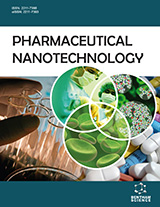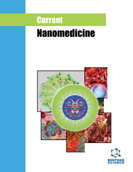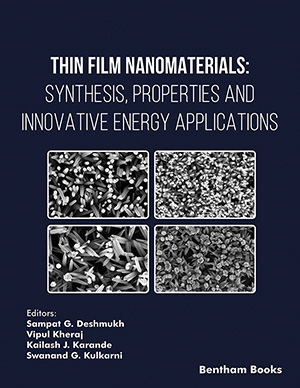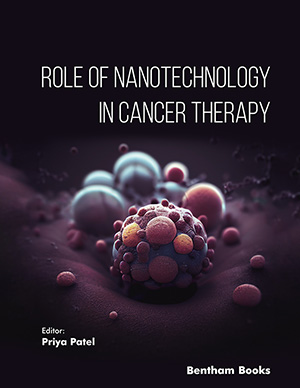
Abstract
The entire world is now in a state of caution since the outbreak of the COVID-19 pandemic. The overwhelmingly high spread and mortality rate due to the SARS-CoV-2 virus has not only made the headlines but also raised alarming concerns for the human community. Applications of nano-biotechnology, along with machine learning, have excellent potential in dealing with serious health issues, mainly in medical science. This review article aims to augment the multidimensional use of silver nanoparticles, especially in the fabrication of textiles and face masks, which could represent a new avenue for prevention. Furthermore, the disinfection of COVID-19, along with other pathogens using silver nanoparticles and machine learning could help in the risk assessment.
Keywords: Silver nanoparticles, COVID-19, super-hydrophobic textile, nanoparticle filter, artificial intelligence, risk.
Current Nanoscience
Title:Can Machine Learning and Nanotechnology Help the Fight Against the Current COVID-19 Crisis?
Volume: 17 Issue: 6
Author(s): Venkatasubbaiah Rashmi, Kanchana V., Jha Prakash Kumar and Konasur Rajesh Sanjay*
Affiliation:
- Department of Biotechnology, Sri Jayachamarajendra College of Engineering, JSS Science and Technology University, JSS TI Campus, Manasagangothri, Mysuru, Karnataka, 570006,India
Keywords: Silver nanoparticles, COVID-19, super-hydrophobic textile, nanoparticle filter, artificial intelligence, risk.
Abstract: The entire world is now in a state of caution since the outbreak of the COVID-19 pandemic. The overwhelmingly high spread and mortality rate due to the SARS-CoV-2 virus has not only made the headlines but also raised alarming concerns for the human community. Applications of nano-biotechnology, along with machine learning, have excellent potential in dealing with serious health issues, mainly in medical science. This review article aims to augment the multidimensional use of silver nanoparticles, especially in the fabrication of textiles and face masks, which could represent a new avenue for prevention. Furthermore, the disinfection of COVID-19, along with other pathogens using silver nanoparticles and machine learning could help in the risk assessment.
Export Options
About this article
Cite this article as:
Rashmi Venkatasubbaiah , V. Kanchana , Kumar Prakash Jha and Sanjay Rajesh Konasur *, Can Machine Learning and Nanotechnology Help the Fight Against the Current COVID-19 Crisis?, Current Nanoscience 2021; 17 (6) . https://dx.doi.org/10.2174/1573413717666210208182816
| DOI https://dx.doi.org/10.2174/1573413717666210208182816 |
Print ISSN 1573-4137 |
| Publisher Name Bentham Science Publisher |
Online ISSN 1875-6786 |
Call for Papers in Thematic Issues
Advanced Inorganic Nanocomposites and their Emerging Applications
This special issue will highlight developments in the recent trends in the synthesis of metal oxides, nanoclusters, biomaterials, 2D nanomaterials, nanocrystals, nanocomposites, etc., and their applications in electrochemical systems, tissue regeneration, energy storage and harvesting, sensors, etc. The novelty of the methods in the chemical synthesis, as well as their ...read more
Advanced Nanotechnology in Forensic Science: Revolutionizing Fingerprint Identification and Crime Scene Analysis
This special issue aims to provide a comprehensive exploration of the innovative fusion between nanotechnology and forensic science. It aspires to bridge the gap between traditional investigative techniques and cutting-edge nanoscale applications, envisioning a paradigm shift in forensic analysis. By compiling the expertise of multidisciplinary experts, the book's objectives include ...read more
Graphene and 2D Materials for Energy Storage and Conversion.
This thematic issue will discuss the recent advances in graphene-based nanomaterials for different energy technologies. Graphene possesses a high surface area, and stable structure and exhibits many interesting electronic, optical, and mechanical properties due to its 2D crystal structure. Graphene is of both fundamental interest and suitable for a wide ...read more
Nanopathology; A Promising Approach for Targeted Cancer Treatment
Cancer is the most challenging diseases in treatment worldwide. Recently, the nanotechnology opened the gate for targeting the cancer as a promising therapy. The small size and exceptional properties of nanoparticles give it several advantages for easily targeting of cancerous cells. Furthermore, this advantage allows them to easily penetrate deeply ...read more
Related Journals
 23
23
- Author Guidelines
- Graphical Abstracts
- Fabricating and Stating False Information
- Research Misconduct
- Post Publication Discussions and Corrections
- Publishing Ethics and Rectitude
- Increase Visibility of Your Article
- Archiving Policies
- Peer Review Workflow
- Order Your Article Before Print
- Promote Your Article
- Manuscript Transfer Facility
- Editorial Policies
- Allegations from Whistleblowers
Related Articles
-
Acronycine Derivatives: A Promising Series of Anti-Cancer Agents
Anti-Cancer Agents in Medicinal Chemistry Binding of CYP2C9 with Diverse Drugs and its Implications for Metabolic Mechanism
Medicinal Chemistry The Relation of the Viral Structure of SARS-CoV-2, High-Risk Condition, and Plasma Levels of IL-4, IL-10, and IL-15 in COVID-19 Patients Compared to SARS and MERS Infections
Current Molecular Medicine Transcranial Brain Stimulation in Schizophrenia: Targeting Cortical Excitability, Connectivity and Plasticity
Current Medicinal Chemistry Recent Literature Review on Coumarin Hybrids as Potential Anticancer Agents
Anti-Cancer Agents in Medicinal Chemistry Thromboprophylaxis in Patients with COVID-19: Systematic Review of National and International Clinical Guidance Reports
Current Vascular Pharmacology Dendritic Cell Immunotherapy for Acute Inflammatory Diseases
Anti-Inflammatory & Anti-Allergy Agents in Medicinal Chemistry Neutralization of SARS-CoV-2 Spike Protein via Natural Compounds: A Multilayered High Throughput Virtual Screening Approach
Current Pharmaceutical Design Resveratrol in Cancer Therapy: From Stimulation of Genomic Stability to Adjuvant Cancer Therapy: A Comprehensive Review
Current Topics in Medicinal Chemistry Natural Products: A Potential New Hope to Defeat Post-acute Sequelae of COVID-19
Current Topics in Medicinal Chemistry Biological Evaluation of Azomethine-dihydroquinazolinone Conjugates as Cancer and Cholinesterase Inhibitors
Medicinal Chemistry Covid 19 May Limit the Use of Anti-hyperglycemic Agents. Does it Call for the Development of New Anti-hyperglycemic Agents?
Current Diabetes Reviews Serotonin 5-HT6 Receptor Antagonists for the Treatment of Alzheimers Disease
Current Topics in Medicinal Chemistry An Update On Proficiency of Voltage-gated Ion Channel Blockers in the Treatment of Inflammation-associated Diseases
Current Drug Targets Structural Diversity of Neuritogenic Substances and their Application Perspective
Mini-Reviews in Medicinal Chemistry Influence of Vitamin D Level on Inflammatory and Prognostic Markers in COVID-19 - A Retrospective Study
Recent Advances in Food, Nutrition & Agriculture Quinazolin-4-One: A Varsatile Molecule
Current Bioactive Compounds Neuronal Nicotinic Receptors and Neuroprotection: Newer Ligands May Help us Understand their Role in Neurodegeneration
Medicinal Chemistry Reviews - Online (Discontinued) p-Benzoquinone as a Privileged Scaffold of Pharmacological Significance: A Review
Mini-Reviews in Medicinal Chemistry Synthesis Strategies and Medicinal Value of Pyrrole and its Fused Heterocyclic Compounds
Medicinal Chemistry
























